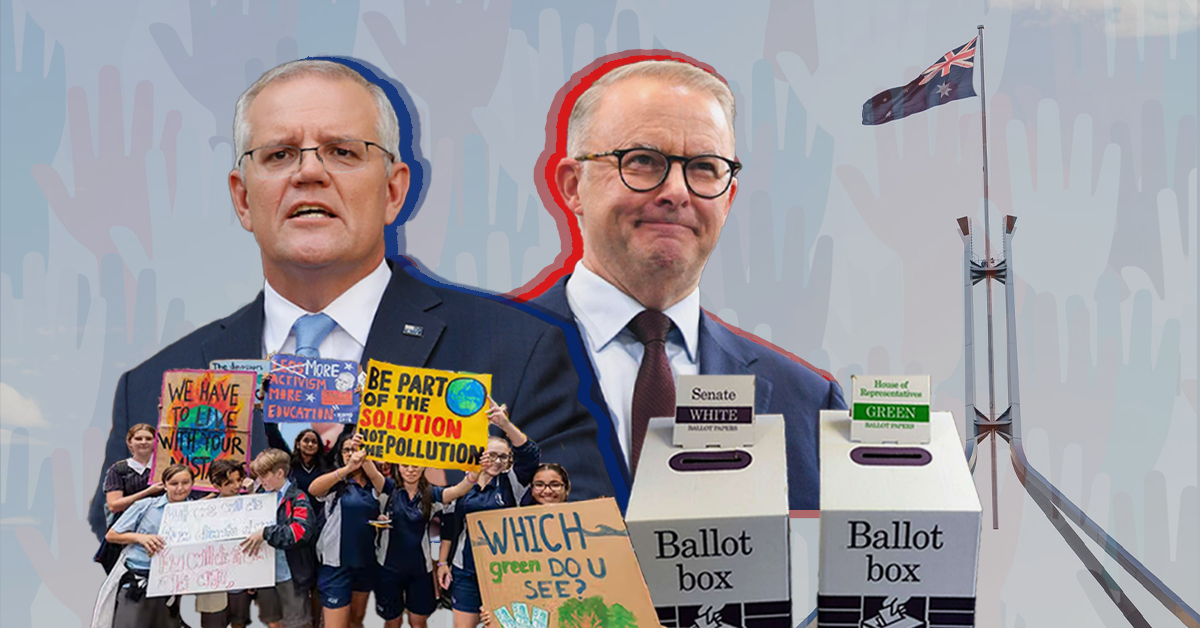Move over ‘quiet Australians’ – could a ‘youthquake’ be the catalyst in the outcome of the upcoming federal election?
It certainly looks that way, with a record number of young Aussies racing to enrol before the enrolment deadline last month.
A staggering 80,000 18-24-year-olds registered before the enrolment deadline, which means 88% of eligible Gen Zs are set to flock to the polls on May 21.
Intifar Chowdhury, associate lecturer, and senior research officer at the ANU’s School of Politics and International Relations, says there’s a strong trend towards issue-based politics amongst young Australians (as opposed to the party politics favoured by older generations).
So what issues and concerns are most likely to influence Gen Z voters?
- Climate change & the environment
We know that climate change is the biggest concern amongst Gen Zs, and it probably won’t surprise you that 93% of young Aussies don’t believe the government is doing enough to address it.
The question is, how will that influence young Aussies when voting, given their cynicism about the major parties’ ability to deliver meaningful action?
Chowdhury suggested this might present a ‘real opportunity’ for independents and the Australian Greens for their climate policies.
- Gender equality, sexism & sexual assault
Meanwhile, the deputy director of the University Of Melbourne’s Youth Research Centre Hernan Cuervo says national conversations about gender equality, sexism and sexual assault will also be spurring Gen Zs into action.
This is no surprise, given the Grace Tame and Brittany Higgins effect on Gen Z.
“(One of the biggest issues in the past two years was) put on the public agenda by the former Australian of the Year Grace Tame and former political staffer Brittany Higgins, who used their own cases to bring those issues to the forefront of debate,” Cuervo said.
“Here we have a conversation we haven’t had as openly in the public discourse in Australia,” Professor Cuervo said. “It is also led by young people and young adults.”
- The pandemic fallout
Many Gen Zs worked the front lines of the pandemic and kept the economy running in ‘essential’ jobs that everyone relied on and no one noticed (like delivering food and stocking shelves during lockdown) – but nevertheless bore the economic brunt of the pandemic.
“Some federal policies, like the COVID-19 Disaster Payment, have helped younger workers. This payment was better than JobKeeper for some because it went to casual workers, so voters may remember it with gratitude,” wrote David Crow, chief political correspondent for the Sydney Morning Herald.
“But nobody helped younger workers when their penalty rates were cut before the pandemic struck, in a change that never delivered the jobs boost claimed. And nobody cut university fees when students had to go online for two years and pay the full rate for a second-best course.”
Fresh on the minds (and bank accounts) of Gen Zs, that’s likely to influence as young Aussies head to the polls next month.
- Mental health
The Coronavirus Classes of 2020-21 had it rough.
School and university students endured the craziest education conditions in more than a century during the pandemic – from being forced to study from home for months on end while socially isolating to being constantly disappointed by cancelled, cherished milestones like year 12 formals, sporting events, and schoolies.
This unsurprisingly had a catastrophic impact on their mental wellbeing, with 78% of Gen Zs telling us their mental health was negatively impacted by their schooling conditions.
But ever the reflective bunch, Generation ‘Self-Aware’ found a silver lining – they learned the importance of taking care of their mental wellbeing and took mental health matters mainstream.
Our prediction? They’ll be favouring policies that address mental wellbeing and access to mental health services.






